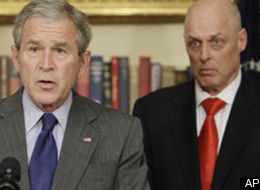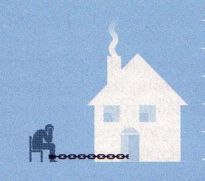Okay, well, maybe I'm doing you a favor as you go into tax season by talking about taxes in an election year.
Fact is, you're not going to get much more than rhetoric from the candidates (ever) and I feel that if you're going to have an opinion it should be based on reflection and deliberation with the facts as they lay.
Today I point you to Paul Krugman and AngryBear as they dove tail nicely around the question of how government intervention affects (I don't mean "effects") the economy.
Right now there is talk about the Federal Reserve cutting the lending rate, again, this time an anticipated .5%; but what does that mean? From
Krugman's Post :
Monetary policy mainly exerts its influence through housing: high interest rates squeeze home construction, low rates encourage it. Interest rates have much less direct effect on business investment. The reason? Housing lasts much longer.
Suppose you take out a loan to buy a machine whose economic life is only 5 years — which is highly likely, given both physical wear and tear and technological obsolescence. How much difference does it make whether the interest rate on the loan is 4 percent or 6 percent? Not much: the monthly payment on a 5-year loan at 4% is less than 5% lower than the monthly payment on a loan at 6%. So interest rates don't have much effect on business investment.
On the other hand, suppose you buy a house with a 30-year mortgage. The monthly payment on a 4% mortgage is more than 20 percent lower than on a 6% mortgage. So interest rates make a lot of difference to housing.
So here's what normally happens in a recession: the Fed cuts rates, housing demand picks up, and the economy recovers.
Krugman goes on to point out that the problem with this strategy, this time, is that the source of recessionary pressure lies largely with the housing market, itself. This happened because accounting for banks changed (the following from
Calculated Risk):
The accounting rule in question, Financial Accounting Standard 114, was adopted in 1993. Lynn E. Turner, a former chief accountant of the Securities and Exchange Commission, recalls that it was enacted because of abuses by financial institutions during the savings and loan debacle. Under the old rule, banks could avoid reporting losses so long as they expected to get the principal back eventually, even if the borrower did not have to pay interest on the restructured loan. The rule put an end to that.
Or at least it put an end to it for most types of loans. These banks live with F.A.S. 114 for their commercial mortgages and corporate loans, but according to Ms. Utermohlen, they don't have systems in place to do the calculations for large numbers of restructured residential mortgage loans.
The calculations, it turns out, are not that complicated. You could do them with a decent financial calculator, or an Excel spreadsheet. But the banks argue that would take too much effort, given the volume of loans likely to be restructured. "This would be extremely time-consuming and would likely involve additional staff dedicated to this purpose," Ms. Utermohlen said in a letter to the Financial Accounting Standards Board this week.
(emphasis added)
That's right, the banks are arguing that they're not responsible for the recession because EXCEL IS TOO HARD TO USE.
Well, it wouldn't be a big deal, I suppose, except for the fact that since this Bush came to office we've been fighting a recession by stimulating the generation of long term loans we call mortgages. Why do this instead of promote long term growth through paying down debt or promoting government spending on education and grants to scientists? I don't know why not. That's not what this administration and those within our government wanted to support.
Probably because those supporters of less government intervention (let the markets fix themselves, that's fair) believe that tax cuts (reducing the amounts of taxes individuals pay) have a stimulating effect on the ecnomy.
They say that instead of paying the government, those individuals will invest in the market (remember the dot-com crash?), or save (Americans now carry thousands more in debt than in savings), or create jobs (unemployment is expected to return to 6% because housing construction has ceased). Here are some graphs from
AngryBear's blog:
Below is a graph showing the annual growth in real GDP per capita, by president starting with Ike, sorted from fastest growth to slowest growth. Data comes from the BEA's NIPA table 7.1. For each president, its calculated from the last year before the President took office to the last full year the President served. (Since JFK was killed and Nixon quit more than half-way through the year, I assumed JFK's "last full year" was 1963 and Nixon's was 1974.)

Now, another graph... This one shows the annual change in taxes as a percent of personal income. With the same color scheme. (I hope you've figured it out!!) This includes taxes on labor and capital gains. The data comes from the IRS.

That's right: the less you tax individuals (now remember, a corporation is by law an individual and given the same or more rights and protections as a human being), the less the economy has benefited.
This should be a no-brainer becuase if you ask someone who actually makes a lot of money they will tell you that paying more in taxes shows that you've made more money.
Why did Carnegie give away all that money? He knew, and stated that he knew, that he made his fortune by exploiting the conditions of his society. He felt he had to give back the largest portion of it so that society would benefit somewhat from his exploitation in the end.
Further, your taxes are there to support you, citizen. You like that road? Your taxes built it. You like that park? Your taxes paid for it. You like that there is less crime? Your taxes are used to alleviate the pressures that lead to crime.
And now, a final note about why you want to better understand taxes and what is unfair about the tax code today. I want to talk about the Earned Income Tax Credit (EITC). The following is from the
Atlanta Prosperity Campaign:
The EITC is a tax benefit for low- to moderate-income working families. U.S. Census Data show that in 2003, the EITC lifted 4.4 million people out of poverty, including 2.4 million children – more than any other single program or category of programs. Without the EITC, the poverty rate among children would have been nearly one-fourth higher. For tax year 2005, 79,338 households in the city of Atlanta received $170,351,176 in Earned Income Tax Credits, resulting in an average EITC credit per household of $2,147. However, the Internal Revenue Service estimates the EITC participation rate for eligible individuals ranges from 75% to 80% Thus, increasing the EITC participation rate for Atlanta families by a mere 10% (7,934) could result in over $15 million in additional benefits. If an individual qualifies for the EITC, he or she might also qualify for the Advance EITC, which allows workers to receive part of their refund in their paychecks during the year. It provides an opportunity for employers to effectively give their employees a raise without having to increase their salary. To increase enrollment in the Advance EITC, employers need only to be equipped with the knowledge and the tools to help their employees apply for the program.
(The emphases, obviously, are mine.)
What's unfair is that there are numerous opportunities for large corporations to avoid paying taxes and they have the financial resources to pay for accountants to find those opportunities. Those accountants, then, turn around (once the egg is on their faces) and make some hare-brained response like the one we have above.








